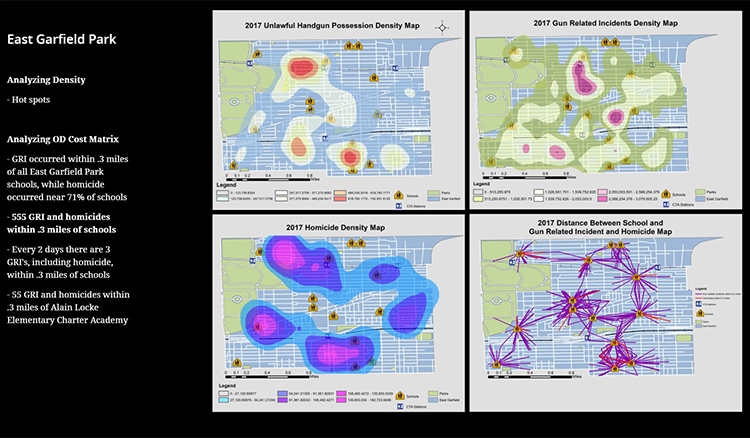 During the GIS course, student Viviana Camacho and her teammate April Mahajan worked with the Chicago Gun Violence Research Collaborative to analyze and develop a story map visualizing the real-time impact of gun violence throughout Chicago. (Image courtesy of Viviana Camacho)
During the GIS course, student Viviana Camacho and her teammate April Mahajan worked with the Chicago Gun Violence Research Collaborative to analyze and develop a story map visualizing the real-time impact of gun violence throughout Chicago. (Image courtesy of Viviana Camacho)
Like many GIS classes, DePaul's geographic information systems for sustainable urban development course provides students with an opportunity to hone their mapping skills and develop techniques to better analyze and capture data. However, to further connect the classwork to the community and DePaul's mission, course developers teamed with community partners across Chicago to not only offer students an opportunity to work with real-life data, but also the chance to build meaningful professional relationships that can lead to job opportunities.
"Bringing in community organizations really enhanced the course experience," says Byungyun Yang, an assistant professor of geography and sustainable urban development who taught this year's cohort. "Community-based projects allow students to work with actual data sets that affect our neighborhoods, allowing students to more deeply connect to the material and topics they're studying."
In the graduate-level course, students examine how GIS can be used to monitor and evaluate efforts advancing sustainability in urban areas. From promoting energy efficiency to improving access to local health food and grocery stores, students analyze data and develop geospatial maps to represent an area's advantages, disadvantages and risks in regard to a specific issue.
"In addition to putting a face or cause to the information they're analyzing, tying this hands-on work to organizations and leaders students can interact and build relationships with, has already led to more meaningful and concrete professional outcomes," Yang says.
For this year's cohort, Yang and other course leaders worked with DePaul's
Irwin W. Steans Center to choose three organizations:
Uptown United, a community economic development organization aimed at supporting local business and attracting new businesses to the Uptown neighborhood; the
Institute for Housing Studies, a research center at DePaul that provides reliable and timely data to inform housing policy decisions and discussions; and the
Chicago Gun Violence Research Collaborative, a group of academic researchers striving to make available to the community, information on evidence-based solutions to gun violence.
"I was very fortunate to be part of CGVRC," Camacho says. "I'm interested in social work and want to understand the environment people live in. Through this course and fellowship, I completely immersed myself in a social issue while using mapping tools to assist stakeholders in visualizing an issue they already knew about, but couldn't picture in their heads."
Currently a research assistant at the University of Chicago, Camacho is still deciding where she wants to go after she graduates from DePaul in summer 2019. However, her experience in DePaul's sustainable urban development program has influenced her outlook and allowed her to search for ways to bring her experience back to her hometown of Bogota, Colombia.
"The course and my time with the CGVRC has allowed me to think about violence issues in Bogota and how we can implement similar research and tools there," Camacho says. "This work inspired me to look at social aspects that must be understood when finding solutions. There are plenty of research projects, tables and graphs, but no maps. This collaboration was like finding the missing puzzle piece on how to begin addressing these enormous issues."